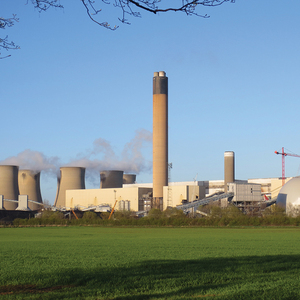EC approves state aid for third Drax unit conversion




Tim Portz
December 19, 2016
BY Erin Krueger
On Dec. 19, The European Commission announced it has determined that U.K. support for the conversion of the third generating unit of Drax Power Station from coal to biomass complies with European Union state aid rules. The EC said it determined the conversion project will further EU environmental and energy targets without unduly distorting competition in the single market.
The U.K. government intends to support the project with a Contract for Difference, which is a premium paid on top of market price of the electricity generated. The project is expected to receive support through 2027.
The U.K. notified the EC of its plans to grant state aid to the unit conversion in April 2015. The commission opened an in-depth investigation in January 2016 to check that the aid would not lead to overcompensation and undue distortions of competition in the biomass market. Based on its analysis, the EC has determined the planned premium will not result in overcompensation. The investigation also determined that increased demand for wood pellets created by the unit conversion could be fulfilled by the market without undue negative side-effects. The commission concluded that the support will not lead to undue distortions of competition in the market for wood-based products.
Once the biomass conversion is complete, the unit will have a capacity of 645 MW and is expected to generate approximately 3.6 TWh of electricity per year. The unit will be fueled exclusively by wood pellets. According to the EC, the plant is expected to consume approximately 2.4 million metric tons of wood pellets per year, mainly sourced from the U.S. and South America.
Advertisement
Responding to the EC’s announcement, Drax said it can now complete the upgrade of its third of six units to run on wood pellets. According to the company, the third unit upgraded started in July 2015. Half the power station will now produce renewable electricity, saving an estimated 12 million metric tons of carbon dioxide per year.
“Drax now leads the world in biomass technology—3 million households are powered with renewable energy generated by Drax and we’re the largest carbon saving project in Europe,” said Andy Koss, CEO of Drax Power. “We have demonstrated how to reinvent a coal-fired power station, using an existing asset, so there are no hidden costs to the grid and it is quick to achieve. This is a testament to the expertise and ingenuity of our engineering team and everyone at the power station.”
“The energy challenge facing the U.K. is how to replace the contribution currently made by coal,” Koss added. “Biomass technology is proven, ready to go and ideally placed to help the country transform to a low carbon future with reliable, secure and affordable renewable power.”
“With the right support from the government, we could upgrade the remainder of the power station to run solely on biomass and provide up to 8 percent of the UK’s total electricity from sustainable sources,” he said.
Advertisement
According to information released by Drax, the U.K. government has set out proposals to end coal-fired generation by 2025 as part of its plan to stimulate more clean energy generation. “The EC’s decision gives approval to the government’s support for the upgrade of Drax power station from coal to biomass, and marks the culmination of a £650 million investment,” said the company in a statement. Koss noted that what has been achieved to date at Drax shows the power station could help switch from coal in an affordable way for bill payers before the 2025 deadline.
The Drax unit conversion was one of eight renewable energy projects selected for the first contracts under the U.K.’s electric market reforms. In 2013, the U.K. Department of Climate Changed announced that the government had sent out draft investment contracts to a total of 16 renewable energy projects that had progressed to the next stage of the final investment decision (FID) enabling for renewables process. In mid-December 2013, DECC announced that only 10 of those projects had been found to be provisionally affordable under the budget caps released earlier that month. The list of projects was later reduced to eight. Those projects, including the Drax biomass unit conversion, the Lynemouth Power biomass conversion, and the 299 MW biomass-fired Teesside project signed contracts in June 2014, along with five off-shore wind projects.
Prior to the Drax announcement, the EC had already approved state aid for the other seven renewable energy projects. The five off-shore wind projects were granted EC approval in July 2014 as part larger announcement from the commission that indicated the U.K’s CfD subsidy program is in line with EU state aid rules. The Teesside project was awarded approval Jan. 22, 2015, while the Lynemouth conversion was awarded approval in December 2015.
Upcoming Events





